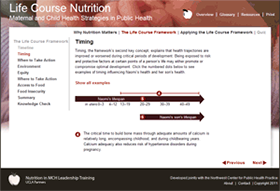Description
A normal increase in infant crying in the first few months of life is the main trigger for Shaken Baby Syndrome, the most serious form of infant abuse. The public health education program Period of PURPLE Crying®, from the National Center on Shaken Baby Syndrome, is an effective approach to preventing infant abuse. In this one-hour Maternal and Child Public Health series webinar, Ronald G. Barr, MDCM, FRCPC describes the development, testing, and implementation of Period of PURPLE Crying®. He includes the results of three randomized trials of the effectiveness of changing knowledge and behaviors of caregivers, including high-risk caregivers. It will also describe the implementation and evaluation of two large trials in North Carolina and British Columbia.
This webinar is part of the Maternal and Child Public Health webinar series.
Intended Audience
State public health personnel working with mothers, women, children and youth, and families in Region 10, US Department of Health Services.
Presenter
Ronald G. Barr, MDCM, FRCPC, is the Canada Research Chair in Community Child Health Research at the Child and Family Research Institute of the BC Children's Hospital, Vancouver, British Columbia. He is Professor of Pediatrics at the University of British Columbia, Vancouver, and Head of Developmental Neurosciences and Child Health at the Child and Family Research Institute. Along with the National Center on Shaken Baby Syndrome, he is the co-developer of the Period of PURPLE Crying®.
Purpose
The Maternal and Child Public Health webinar series provides up-to-date information on topics related to Title V maternal and child health (MCH) national performance measures. A performance measure describes a specific need that, when successfully addressed, leads to better health outcomes. As part of the Title V Maternal and Child Health Services Block Grant, all state MCH agencies are required to report on their progress toward achieving the targets they set for these 18 national performance measures.
The series is supported by the Maternal and Child Public Health Leadership Training Program with a grant from the Maternal and Child Health Bureau, Health Resources and Services Administration. The program provides interdisciplinary, graduate-level training in maternal and child public health epidemiology and practice, including applied research, program planning and management, policy development, and advocacy.
Format
The series of one-hour training sessions will be held online, using iLinc web conferencing software. Each session will be recorded and the archives will be posted on this web site.


